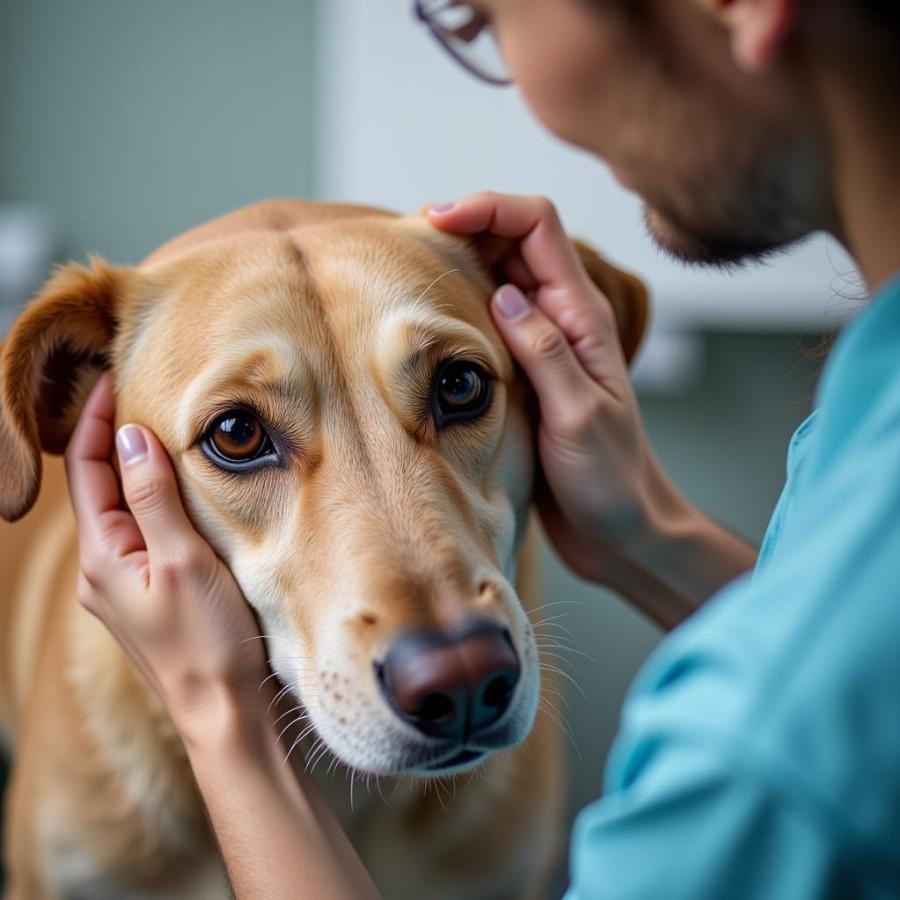When you notice your old dog just standing and staring, it’s natural to be concerned. This behavior, while sometimes unsettling, can stem from a variety of reasons, ranging from normal age-related changes to underlying medical conditions. Understanding what might be causing this behavior is crucial for ensuring your furry friend’s well-being. In this article, we’ll delve into the common causes of staring in older dogs and offer practical advice on how to address them.
Why Is My Senior Dog Staring into Space?
Several factors can contribute to an old dog just standing and staring. Let’s explore some of the most common ones:
Canine Cognitive Dysfunction (CCD)
Similar to Alzheimer’s disease in humans, CCD can affect senior dogs, leading to changes in behavior, including staring, disorientation, and altered sleep patterns. If your dog seems confused, paces aimlessly, or barks at seemingly nothing, CCD might be a contributing factor.
Vision and Hearing Loss
As dogs age, their senses can decline. A dog who is losing their sight or hearing might stare blankly as they struggle to process their surroundings. They might also be staring at something you can’t see or hear.
Pain or Discomfort
An old dog just standing and staring might be experiencing pain or discomfort. Arthritis, dental issues, or internal organ problems can cause significant pain, leading to changes in behavior like staring, lethargy, and decreased appetite.
Anxiety or Stress
Changes in routine, new pets in the household, or loud noises can trigger anxiety or stress in older dogs. This can manifest as staring, panting, pacing, or destructive behavior.
Seizures
While less common, staring episodes can sometimes be a sign of seizures, particularly if accompanied by other symptoms like twitching, collapsing, or loss of consciousness.
What Should I Do If My Old Dog Is Just Standing and Staring?
If you’re worried about your senior dog’s staring behavior, it’s crucial to consult with a veterinarian. They can perform a thorough examination to rule out any underlying medical conditions and recommend appropriate treatment.
Veterinary Check-up
A veterinarian can assess your dog’s overall health, check for signs of pain or discomfort, and perform diagnostic tests if necessary. Early diagnosis and treatment are essential for managing conditions like CCD, arthritis, and other age-related ailments.
Environmental Enrichment
Creating a stimulating and comfortable environment for your senior dog can help alleviate anxiety and boredom. Provide comfortable bedding, interactive toys, and regular opportunities for gentle exercise. Consider a puzzle feeder to keep your dog mentally engaged.
Routine and Consistency
Maintaining a consistent daily routine can be particularly beneficial for older dogs, especially those experiencing cognitive decline. Regular feeding times, walks, and playtime can provide a sense of security and predictability.
Managing Pain and Discomfort
If your veterinarian diagnoses your dog with a painful condition like arthritis, they might prescribe pain medication or other therapies to help manage the discomfort. Supportive bedding and ramps can also help ease joint pain.
 Senior Dog at the Veterinarian
Senior Dog at the Veterinarian
How Can I Help My Old Dog with CCD?
While there’s no cure for CCD, there are ways to manage the symptoms and improve your dog’s quality of life. Medications, dietary supplements, and behavioral modifications can help slow the progression of the disease and enhance cognitive function. If you suspect your dog is suffering from CCD, please see our article on dog staring at wall.
Frequently Asked Questions (FAQs)
- Is staring always a sign of a serious problem in older dogs? Not necessarily. Sometimes, dogs simply stare due to boredom or because they’re focused on a distant sound or smell. However, persistent or unusual staring warrants a veterinary check-up.
- How can I tell if my dog is in pain? Signs of pain in dogs can include changes in behavior (like staring, lethargy, or aggression), changes in appetite, difficulty moving, and vocalization.
- What are the early signs of CCD? Early signs of CCD can include disorientation, changes in sleep patterns, house soiling, decreased interaction with family members, and staring into space. For more information, you can read about dog staring at camera .
- Can diet affect cognitive function in dogs? Yes, a balanced diet rich in antioxidants and omega-3 fatty acids can support brain health in older dogs.
Further Questions?
For further insights into dog behavior, you might find our articles on why does my dog stare at the wall and do bunnies and dogs get along helpful. Additionally, you can explore resources related to dog leader dies now other 2 dogs are fighting.
Conclusion
Observing your old dog just standing and staring can be concerning, but understanding the potential causes can empower you to take appropriate action. Whether it’s age-related cognitive decline, sensory loss, pain, or anxiety, seeking veterinary advice is crucial for ensuring your dog’s comfort and well-being. Early intervention and appropriate management strategies can help your senior companion enjoy their golden years to the fullest.
Beaut Dogs is your trusted source for comprehensive and reliable information about the world of canine companions. From breed characteristics to health and training, we provide expert guidance for every stage of your dog’s life. When you need assistance, contact us via Email at [email protected] to get detailed and accurate answers from Beaut Dogs. Visit https://beautdogs.com for a wealth of resources and expert advice to help you provide the best possible care for your beloved furry friend.